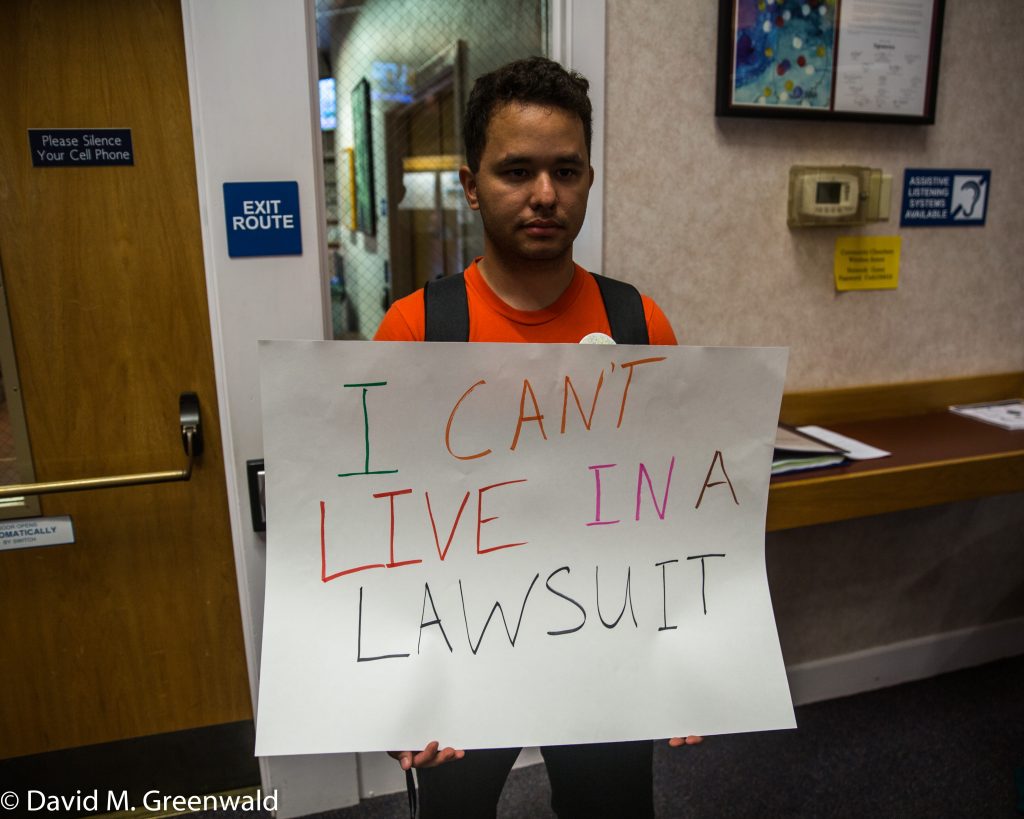
This week, Yolo County Judge Stephen Mock delayed the court trial for Lincoln40 – the student housing project approved by the council on a 5-0 vote last March. When built, it will house 708 students. While the trial itself was just delayed by a little over two weeks, for students living in housing and food insecure conditions, these delays mean prolonging the current housing crisis.
It seems unlikely that Judge Mock would invalidate Lincoln40, particularly considering the circumstances of the housing crisis and the lack of glaring problems with the environmental review process – just as other judges have not found merit in previous lawsuits. However, what these suits do add is time and expense – a cost born not just by the developers but by the students who end up without adequate housing and having to pay more for the housing that they do have.
Best case scenario is that Judge Mock will hear arguments on February 8, he would then have about 90 days to rule – give or take, that pushes a decision into May and then, assuming he rules in favor of the city, the plaintiffs would have 60 days to appeal, pushing the green light to perhaps July. You would probably be looking at a tight timeframe of two years to get the financing approved and housing ready to go for September 2021 – already a delay of a year over the original hope of 2020.

For students, these are challenging times. The Vanguard met on Thursday with Aggie Compass and will have a follow up on our food insecurity series. Aggie Compass and the county service providers believe that around 43 percent of students are food insecure but are uncertain what proportion of those students are in serious enough condition to actually be missing meals.
Meanwhile, housing insecurity puts the number around 17 percent according to recent surveys. Unofficially the Vanguard has noted that in a number of locations such as the South Davis Safeway parking lot, you can see a number of vehicles with sleeping students.
In a recent letter from ASUCD Senator Alisha Hacker, she noted, “As the rainy weather saturates our city, I can’t help but think of my fellow students who have no protection from it. These are some of the students who inspired me to run for my senate seat.”
“When we came to UC Davis, we never expected finding housing to be an integral part of our college experience, yet all too often it is. Housing insecurity and homelessness are a real problem for UC Davis students,” she writes. “In fact, in a recent survey, nearly a fifth of students reported experiencing homelessness at some point during the last school year—whether that be couch surfing, sleeping in a car, in a public restroom somewhere, or worse.”
Ms. Hacker adds: “While I am energized about the recent passing of a few key student-oriented housing projects, I think it’s important to remember that our housing crisis in Davis is far from over. I am frustrated when I drive by sites with approved projects that are in limbo by lawsuits. Lincoln40 is a perfect example of this—an otherwise shovel-ready project that has been stymied now for the better part of a year because one person doesn’t want us to live in her backyard.”
So far the city council has passed a number of projects: Sterling Apartments, Lincoln40, Nishi, and Davis Live Housing. Two of those projects – Sterling and Davis Live Housing – have been allowed to go forward, with Sterling in the process of construction.
Nishi and Lincoln40 remain locked in litigation.
It would be one thing if there were serious problems that these lawsuits had to address. But the city went above and beyond the requirements by do a full EIR – when, as former Davis Mayor Robb Davis noted, the city wasn’t even required to submit an EIR for the Lincoln40 project, because as a Transit Priority Project it was exempt from the need to do an EIR.
Attorneys for the city continue to believe that the lawsuit is without merit.
In their response brief, the city argues – which is a point we have made previously, “Because few environmental comments were raised during the administrative process, Rainier’s Opening Brief relies almost entirely on new issues that were not administratively exhausted. On this basis alone, Rainier’s Amended Petition should be denied.”
The respondents note, “Rainier largely fails to explain how she satisfied CEQA’s exhaustion requirement as to any of the issues advanced in her Opening Brief.”
The city received a 2009 decision that points out: “Exhaustion of administrative remedies is a jurisdictional prerequisite to maintenance of a CEQA action.” And further that “no action or proceeding may ‘be brought… unless the alleged grounds for noncompliance… were presented to the public agency orally or in writing by any person during the public comment period….”
In addition the city does not believe that the lawsuit will survive on the merits either – indeed, they argue that it is “meritless” with substantial evidence to support “the EIR’s conclusions” arguing, “none of Rainier’s claims have merit.”
Given the statewide housing crisis and the local conditions, we don’t believe that a judge like Judge Mock is going to invalidate the council-approved project unless it suffers from serious flaws – and we just don’t see it.
The plaintiff’s lack of seeking legislative solutions probably will give the judge an easy way out, but, given the totality of the facts here, this is simply a tactic that will no longer work in Davis.
Since 2013, we have seen a number of lawsuits. None of them have been decided on the merits for the plaintiffs. The only “wins” for the plaintiffs have been for settlements and the city immediately recognized that settling lawsuits creates an incentive to bring about additional ones.
Each of these will be litigated until the end. We have already seen defeats for Michael Harrington on his neighbor’s Conditional Use Permit and Nishi. The Marriott did settle to allow for owl mitigation. The Hyatt House and Hotel Conference Center also entered into settlements. WDAAC was recently dismissed.
The remaining lawsuits are against Trackside, Nishi and Lincoln40, with the hope that Lincoln40 will resolve soon to allow the start of construction to house students in desperate need of housing.
—David M. Greenwald reporting







David Greenwald said . . . for students living in housing and food insecure conditions, these delays mean prolonging the current housing crisis.
Crisis! Crisis! Crisis! The Vanguard is having a Crisis! It’s an editorial crisis of false equivalency.
There is absolutely no relation between food insecurity and Yolo County Judge Stephen Mock’s action this week. The lawsuit has absolutely nothing to do with food. Judge Mock made no references to food The Lincoln 40 developers have mentioned food insecurity exactly zero times in both their lawsuit and their public statements about the lawsuit.
Drawing a direct link between Judge Mock’s actions vis-a-vis the lawsuit and food insecurity is a gross failure of journalistic integrity.
JMO
Matt – you impugn David over what you label “just your opinion”? Isn’t the column, just his opinion?
My opinion – there is a direct link between the two. Building more housing will lower rent. Rent is the biggest cost for students. Having $40 to $50 additional even would greatly reduce food insecurity. YOU MAY NOT AGREE WITH THAT, but it “JUST YOUR OPINION.”
Craig Ross said . . . Building more housing will lower rent.
Craig, please explain how under the principles of Microeconomics rent prices will be lowered in a market where:
(1) documented current Demand exceeds documented current Supply by between 10,000 and 20,000 beds, and
(2) there has been a consistent documented addition of incremental Demand per year of an average of at least 1,500 beds (1.5 times the increase in UCD enrollment) in the UCD-generated Demand plus an undetermined, but not insignificant, increase in Demand that is not associated with UCD, and
(3) virtually no increase in Supply over that same period, and
(4) the construction time for new multi-family housing is significantly more than three years from application to occupancy.The simple answer to that question is that under the principles of Microeconomics rent prices will be increased in such a market because the 1,500 bed additions to Demand will each year be greater than the bed addition increases in Supply, unless those additions exceed 1,500 beds per year.
Further, even if an annual increase in beds Supply exceeds the annual increase in documented beds Demand in any one year, the excess will not reduce prices, but be wholly absorbed as an offset to the between the current 10,000 and 20,000 bed imbalance.
That isn’t opinion, it is a calculation based on straightforward Microeconomics principles.
Bottom-line, no matter how hard you and David want to spin your political rhetoric, there is NO direct link between the two in the Davis housing and food marketplaces.
Craig Ross said . . . “YOU MAY NOT AGREE WITH THAT, but it “JUST YOUR OPINION.”
And, if you look closely Craig, you will see that I clearly labeled my opinion as opinion. Nothing more, nothing less.
More accurately, a higher supply will likely prevent rent prices in Davis from skyrocketing quite as fast, several years from now.
And that wouldn’t help with food insecurity?
I think where Matt has this wrong is that he’s failing to connect for some reason that the driver for food insecurity isn’t the cost of food, but rather than cost of housing.
David, if Craig had made the point that the current high price of housing is one of the contributing factors to a portion of the student food insecurity problem and left it at that, I would not have refuted his premise.
However, that was not his premise. He very clearly stated that “Building more housing will lower rent” and I equally clearly showed that calculations based on straightforward Microeconomics principles show that his assertion is erroneous.
I stand by my statement to him … bottom-line, no matter how hard you and Craig want to spin your political rhetoric, there is NO direct link between the two in the Davis housing and food marketplaces.
His point aside – I disagree on this: “there is NO direct link…”. Again – the cost of food is not the driver here. What is? Housing. I think Alan is probably closer to be correct that additional housing will not cause housing prices to fall, but it could cause them to stabilize. I don’t see how we fix this problem without addressing housing and I see the two issues as interrelated.
Alan Miller said . . . More accurately, a higher supply will likely prevent rent prices in Davis from skyrocketing quite as fast, several years from now.
Alan, your statement is likely to be true as long as the following conditions are met:
(1) the annual increase in beds Supply in the Davis housing marketplace exceeds the annual increase in documented beds Demand, and
(2) the current between 10,000 and 20,000 bed imbalance between Housing Demand and Housing Supply is substantially reduced
Otherwise, under the principles of Microeconomics, the upward pressure on prices will only be limited by a factor known as Price Elasticity … and Price Elasticity is affected not only by the local housing market but also the Statewide housing market, and what we have seen historically since 1996, when the Davis rental housing market began its unabated run of vacancy rates that are below 1%, is that inflation of Davis rents has not exceeded California statewide increases in rents.
I’ll say it again, I’m tired of people who sleep in a warm bed every night, talking about stuff they have not experienced.
Craig, you once again are talking through your hat. [Moderator: edited]
According to the criteria used by the UCD housing security and food security survey, I was homeless three out of my four years at Cornell University and was food insecure either three or all four of those years.
I suggest you try and avoid making assessments about the personal life experiences of others without checking the validity of your sources first.
Hello Matt, do you have a link to the survey? Thank you.
Gladly Edgar.
The Student Food Security Task Force webpage, which contains an Executive Summary of the survey can be accessed HERE
The full report is titled and linked as follows: University of California Davis — Promoting Food Security for UC Davis Students — Report and Recommendations of the Chancellor’s Task Force on Student Food Security
I slept in the Amtrak parking lot in my car for a week (dirt and west of the tracks at the time) during college. So by CR’s criteria, I can talk about this. Or does my current warm bed disqualify me . . . or his warm bed him? Although I must admit I know not the temperature of CR’s bed.
That wasn’t just a metaphor. As with so many progressive issues, I believe the promoters of the issues shoot themselves in the foot by inflating the numbers with manipulated statistics in an attempt to glorify the crisis.
In the situations mentioned by MW and I, neither situation of our youth was pleasant and was tough, but neither of us was going hungry. Because we, and many students today, would be labeled ‘housing insecure’ by the current methodology, I see this as including people who aren’t actually ‘homeless’ by the common term, and I believe this is how many view this terminology.
To take this to the next level of why this doesn’t sit well with me, is that there reportedly are students who really are homeless and really could use our societal assistance. CW mentioned ‘hundreds or thousands’ and the ‘the south Davis Safeway parking lot’.
I bike a lot at night, and go into the far reaches of backwater Davis, and I notice things ‘out of place’. While I am certain many hide well, and can’t imagine there are literally thousands of homeless students, but I certainly can believe there are some are living in cars whether by choice to save money (I’ve known people who did this — usually more a van than a car) or because they literally don’t have the option.
My point is let’s help those that need help, and not inflate the problem in an attempt to prove there is a problem. I believe though well intentioned, the ‘big tent’ approach may backfire.
So one point that I have made is: what is the problem? Do we have a good number? When I asked the university for the first time back in 2016, they didn’t have. They have since done a survey and there are some problems with the survey, because in part I agree with you – the numbers are too high because they are measuring broadly. For instance they gave a number of 43% for food insecurity but that includes both those groups that are skipping meals due to lack of funds and those who believe they may have to and they can’t separate the two populations within their survey. That’s not completely helpful.
If we are talking about student homelessness, one thing I don’t understand is the occupancy limitation of apartment units.
Typically, an apartment complex only allows as many person as there are rooms in one unit (i.e. there can only be 3 people for a 3-bedroom apartment). But I would imagine (and as I was a student), many would not mind having roommates IF the apartment contract would allow so (i.e. allowing 4 people to share a 3-br unit).
If this is allowed, we instantly gain a lot of bed spaces, and help students save a lot of money.
” . . . has been stymied now for the better part of a year because one person doesn’t want us to live in her backyard.”
Is this literal? Does Rainer have Lincoln40 in her backyard, or is that just a play on the ‘not in my backyard’ thing and she actually lives across town? (note: I’m not trying to dox her so don’t give her address — I just wanted to know if she lives adjacent to the project or miles away.)
Lincoln40 is in my backyard (will be the direct view out 3 of my windows and will be visible out of six windows). The developers approached our neighborhood and asked our concerns, mitigated most of them, treated us with respect, and signed a memorandum of understanding with our neighborhood. We can contact them in a heartbeat about any concerns and they’ll listen. Thus, it frustrates me that Lincoln40 was sued anyway, as good developers should be rewarded for being good neighbors.
This is in contrast to Trackside, whose developers checked off all the boxes and said they worked with us. The difference is that Lincoln40 actually did, Trackside just did what they thought they had to do to get what they thought they wanted. Big difference. The City shouldn’t reward local developers necessarily, they should reward developers — local or not — that treat the citizens of Davis with real respect. Big difference.
I believe she lives on the other side of town.
Thanks . . . so she could be more accurately portrayed as a NIOPBY . . . ‘other peoples’ . . . or a NID ‘ . . . ‘davis’ . . .